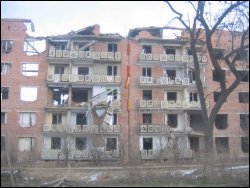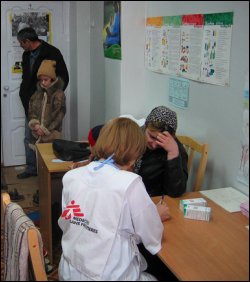Pressured by Russian and Ingushetian authorities, many Chechen refugees in the neighboring republic of Ingushetia have headed back home. Today, there are only 34,000 refugees in Ingushetia. Just one and half years ago, there were 80,000. To respond to this new reality, Doctors Without Borders/Médecins Sans Frontières (MSF) decided to resume programs in Chechnya. Denis Lemasson, MSF's program manager in the region, was in Grozny on February 11. Here is his account.
NAZRAN, INGUSHETIA - Based on the information we gathered, early that evening we decided to go to Grozny the next morning. We woke up early. In the fog, we crossed the famous Kavkaz checkpoint separating Ingushetia and Chechnya without any problems. We passed Russian tanks crawling at a snail's pace, flanking mine clearing teams, and finally reached Grozny, in ruins. This is a city where one looks, hopelessly, for signs of rebuilding. It is a place where one feels, almost physically, the extent of past bombings and the desire to wipe the city off the map.

Damaged building in Grozny, Photo © Denis Lemasson / MSF |
Return to Chechnya
However, Grozny is no longer a ghost town. Many Chechens have returned. Three years of pressure and the Russian and Ingushetian authorities' policy of intimidation have borne fruit. Today, there are no more than 34,000 Chechen refugees in Ingushetia. They numbered 80,000 just one and half years ago. "Even if it means suffering the same level of violence and fear, it's better to go back," the refugees say. In spite of the winter, several thousand more returned over the last three weeks.
For security reasons–MSF volunteers have been kidnapped in the North Caucasus–it has been difficult to support direct medical programs in Chechnya. In Ingushetia, our activities were focused in the camps and the kompakniki, abandoned farms and factories where refugees were living. We offered obstetric-gynocologic and pediatric consultations as well as logistical support, to improve their miserable living conditions. In 2004, as many Chechen refugees left Ingushetia, we watched the number of consultations drop, while needs grew in Chechnya.

Photo © Denis Lemasson / MSF |
In late 2004, after thinking long and hard about the risks, we decided to resume our activities in Chechnya. Because of the risk of kidnapping, international volunteers cannot have an on-going presence in the North Caucasus but are limited to irregular and short visits.
Unending War...
We cannot allow the Russian central government's public statements, repeated by international institutions -- that the conflict is moving towards a "post-conflict" situation or becoming "normalized" - to hide the completely different reality from us. The war is not over. Rather, its methods have changed. The number of deaths has remained constant and has even increased in recent months. It is more difficult now to keep track of them. "Cleansing" operations, which were often directed at entire villages, are now targeted.
The Russian military presence has not changed and still numbers around 80,000 soldiers. Military operations still occur at strategic points. Furthermore, several Chechen factions that emerged during the war, and have been encouraged by federal authorities, are turning against each other. "Everyone suspects everyone else," people say. "People don't discuss the conflict or politics even inside their own families and in their own homes." Today, the Chechens are as afraid of the armed Chechen militias as they are of the Russian soldiers.
Simultaneously, we have observed a progressive worsening of security throughout the North Caucasus during the last nine months. It is now affecting Kabardino-Balkaria and Karachaevo-Cherkassia.
Precarious Lives and Deteriorating Health

MSF doctor performing a consultation in the pediatric unit. Photo © Denis Lemasson / MSF |
The living conditions facing the entire population of Grozny are even more difficult because of this year's particularly harsh winter. In early February, temperatures ranged between 0° and -10°C (14° F and 32°F). People found it very difficult to stay warm, not everyone had access to adequate health and sanitary facilities (toilets, showers, etc.) and some often had to buy water. No action was taken to provide liveable conditions for the Chechens returning home. Some people were lucky enough to come back and find their family home, but 36,000 were housed in TACs (Temporary Accommodation Centers), where only electric heaters are permitted in buildings with irregular power supply.
Despite recent statements from the ministry of health, and even in the face of such precarious conditions, the health-care system is not improving. When hospital supplies are available, they can meet only 40 to 50 percent of the needs. For example, the Grozny maternity ward has not received medicines or medical supplies in two and half months and the burn unit has been without supplies for four. MSF provides the only support available to these two facilities.
MSF Medical Activities in Chechnya

Women exiting the gynocological unit. Photo © Denis Lemasson / MSF |
In early February, MSF opened two additional consultation centers in Grozny. They include a gynecological unit in Polyclinic 5 and a pediatric unit in Polyclinic 3. These two programs, as well hospital and clinic services MSF has been running since 2000, offer some of the only free medical care of its kind in the city. From the start, even without giving any notice, we have been seeing 30 to 40 patients each day in our gynecological clinic and conduct some 60 consultations daily in the pediatric clinic.
"Patients arrive in a catastrophic state," the MSF doctors tell us. "Their living conditions are worse than those of the refugees two years ago in Ingushetia." Most of our patients have multiple illnesses. We provide them comprehensive care.
The disastrous sanitary conditions, like the stressful setting, are linked to an "active" conflict, which is far from the so-called "normalization" that Russian authorities describe. On this visit, I could see that nothing is in place to provide the refugees, pushed to return to Chechnya, a decent welcome.
Security conditions remain troubling and restrict the presence of international and independent humanitarian aid. We must continue to advocate for a space to work, threatened by recent, increasingly radical events.




